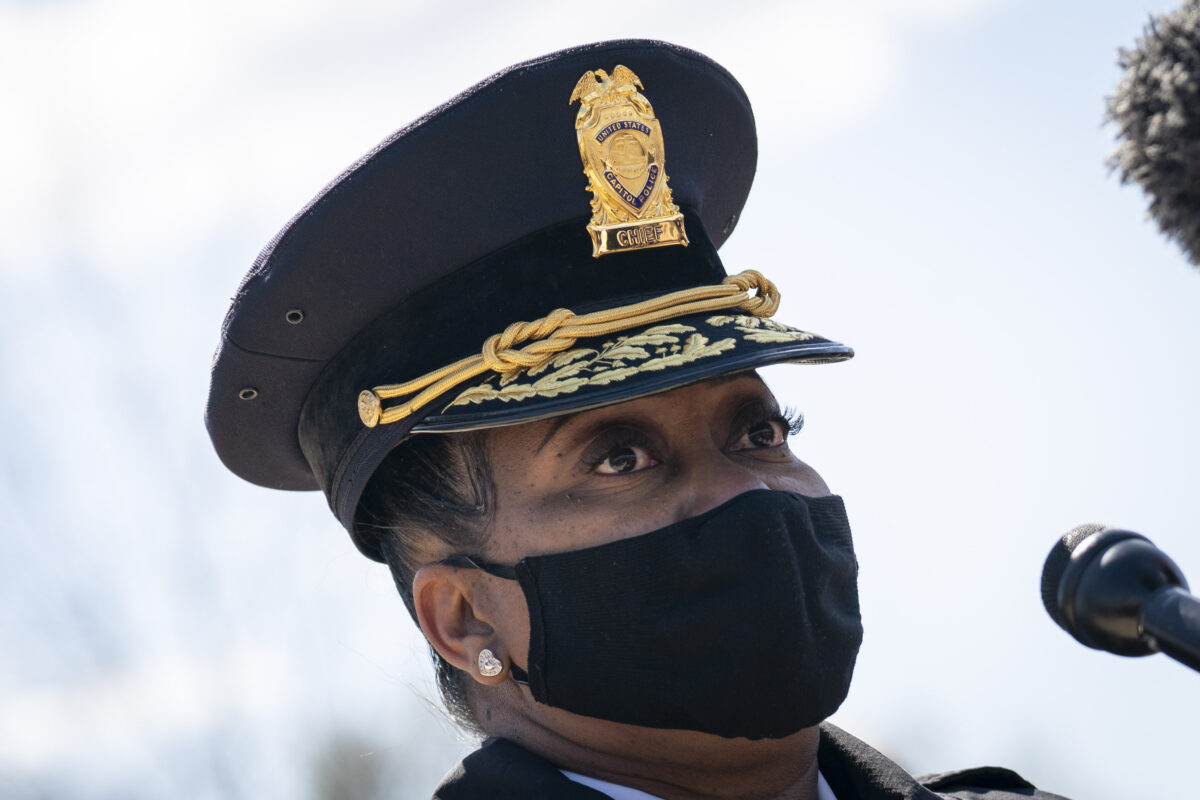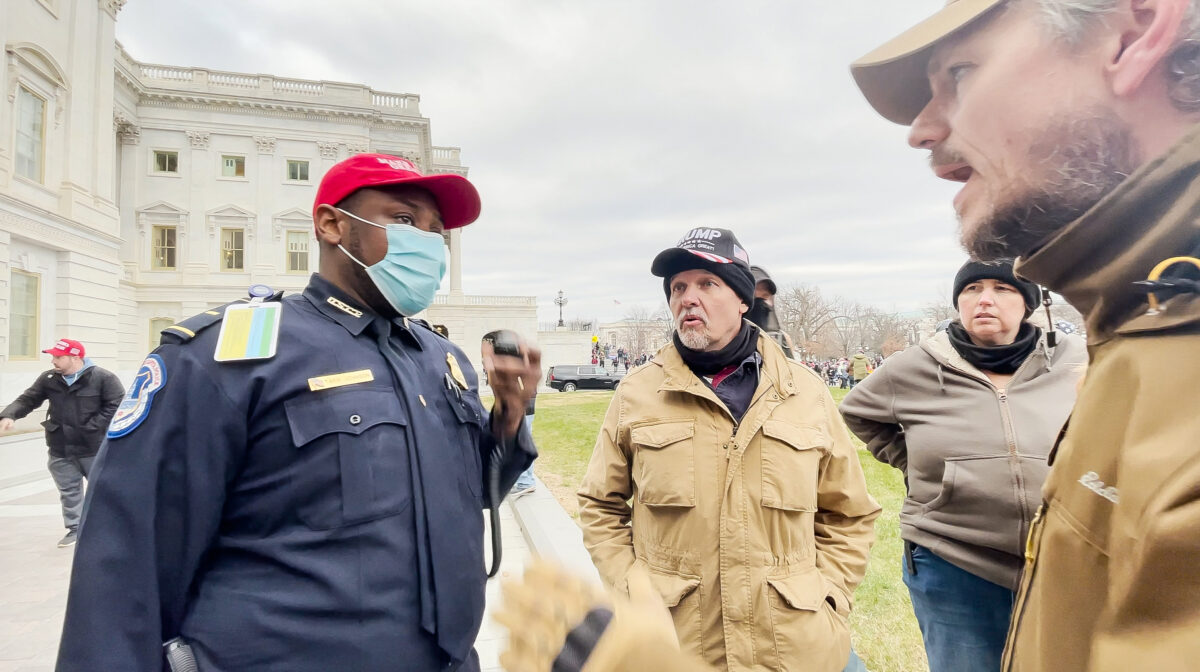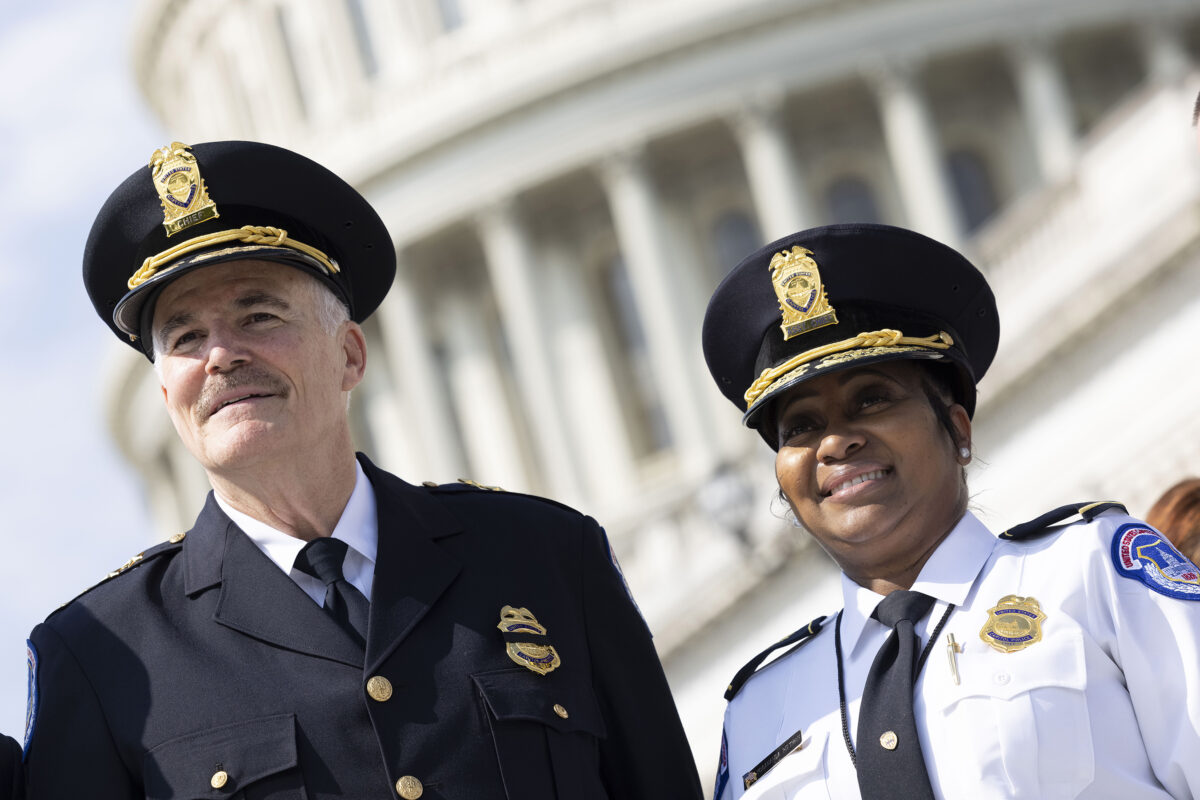
U.S. Capitol Police (USCP) granted former Acting Chief Yogananda Pittman five months of leave without pay after she departed for a new job, an arrangement that qualifies Pittman for pension benefits but violates department policy, a congressional panel was told on May 16.
Capitol Police Chief J. Thomas Manger told the Committee on House Administration that he negotiated the arrangement with Pittman and her attorney. The Capitol Police Board, which oversees the USCP, was not consulted, he said.
“This was a negotiated separation agreement,” Manger said in response to questions from U.S. Rep. Morgan Griffith (R-Va.). “I signed off on the decision.”
Weeks after the 2022 midterm elections put Republicans back in control of the House of Representatives for the 118th Congress, Pittman announced she was leaving the USCP to become chief of police at the University of California-Berkeley.
Her new job, which pays $283,500, began on Feb. 1.
At that time, Pittman was not eligible for Capitol Police pension benefits. Her separation agreement allows her to be on “leave without pay” until she can file for retirement in June, Manger said.
“Her intent is to file her application for retirement in about 30 days,” Manger said.
The arrangement led to some terse exchanges at the hearing in the Longworth House Office Building.


“If she left without being [on] leave without pay, would she get retirement in June for the years she served here or not?” Griffith asked.
“I don’t believe she would have,” Manger said.
“That’s a substantial benefit to her, and that’s in violation of the Capitol Police Board regulations prescribing a unified leave system for members and civilian employees of the United States Capitol Police, is it not?” Griffith asked.
“Not if it’s a negotiated separation agreement,” Manger said.
“Where does it say that in here?” Griffith asked, holding up a copy of USCP regulations.
“Well, it doesn’t say that in there,” Manger said, “but we’ve done this; it’s been done before.”
Pittman, who joined Capitol Police in September 2001, was a controversial figure at USCP leading up to and on Jan. 6, 2021.
The USCP intelligence division that she oversaw has come under harsh criticism for not sharing threat assessments and intelligence with line officers before or on Jan. 6.
“What infuriates me is knowing our leaders had intelligence that should have driven a massive security response,” said Gus Papathanasiou, chairman of the U.S. Capitol Police Labor Committee, the officers’ union.
“If then Assistant Chief Pittman, who was in charge of intelligence, had shared that information, it would have allowed us to prepare properly, coordinate with partner agencies and the National Guard as the proper show of force would have been on display, and January 6th possibly would have turned out differently,” Papathanasiou said on the second anniversary of Jan. 6.
Capitol Police had been told that President Donald Trump’s speech at the Ellipse on Jan. 6 could draw as many as 3 million people, according to February testimony in a Jan. 6 criminal case.
Pittman was accused by a former USCP lieutenant of failure to respond to his urgent calls for permission to evacuate the U.S. Senate at about 2:30 p.m. on Jan. 6.
Tarik Johnson’s repeated requests for direction made over USCP radio went unanswered, according to recordings of the radio traffic obtained by The Epoch Times.


Johnson then forged ahead with the evacuation of the Senate, announcing over the air that he would take any discipline for his decision to act.
Security videos reviewed by The Epoch Times showed that the Senate evacuation was carried out just as a large crowd of protesters forged down another hall toward the chamber.
Johnson said he took the initiative to avoid having lawmakers trapped in the Senate Chamber or having them come face to face with protesters.


Johnson was placed on leave by the USCP on Jan. 9, 2021. Disciplinary charges against him were lodged for wearing a Make America Great Again (MAGA) baseball cap on the east steps of the Capitol as he moved in and out of the crowds.
Johnson likened the cap to a safety helmet because the protesters listened to him, allowing him and Oath Keepers member Michael Nichols to evacuate 16 Capitol Police officers stuck in the foyer outside the Great Rotunda.
According to Johnson, the disciplinary charges for the cap were a cover. His real sins, he said, were for taking decisive actions to evacuate the House and Senate when superiors failed to act. After 17 months on suspension, Johnson resigned from the USCP.
Griffith quoted from Capitol Police Board regulations that state, “As a basic condition of leave without pay, there must be a reasonable assurance that the member or civilian employee will return to duty at the end of the approved period.”
Rep. Stephanie Bice (R-Okla.) also questioned Manger why leave without pay was allowed in Pittman’s case.
“Is she expected to return?” Bice asked.
“No. Pursuant to a negotiated separation agreement, she left the department February first,” Manger said. “She has no police powers. She has not been paid. There has been no double dipping.”
The Epoch Times asked Capitol Police for information on Pittman’s salary and expected pension benefits, but did not receive a reply.
Diana Harvey, associate vice chancellor for communications and public affairs at the University of California-Berkeley, told The Epoch Times that neither Pittman nor the university would comment on the congressional hearing.


![[GOOD PRESS] ON[GOOD PRESS] ON](https://georgemagazine.com/wp-content/uploads/2024/08/16389056566437433941_2048-300x300.jpeg)

Discount Applied Successfully!
Your savings have been added to the cart.